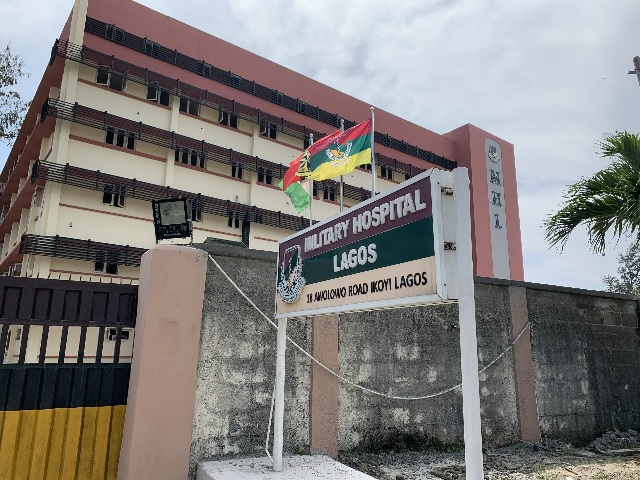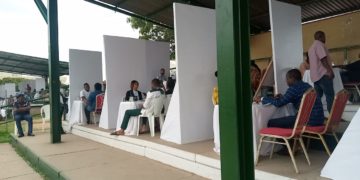The industrial action embarked on by resident doctors who make up the bulk of medical experts in Nigeria’s tertiary hospitals has crippled health activities in hospitals across the country.
While patients are left stranded, with pockets of skeletal services in some government hospitals, LEADERSHIP Weekend’s investigations revealed that patients have resorted to seeking the services of military hospitals for medical attention.
Our findings showed that most of the patients rejected at public hospitals have turned to either private clinics or military hospitals to seek medical care.
For instance, major surgeries have been suspended at the Parklane hospital, Enugu.
A relative of a patient who had gone to the hospital for a surgery disclosed that no doctor at the surgery department agreed to accept the sister for an operation.
But it was observed that most of the patients have now resorted to the 82 Division military hospital in Enugu.
Our correspondent who visited the hospital sighted many patients who were rejected because of the ongoing strike seeking for treatment.
It was further observed that relatives of patients who came for surgery have relocated them from Parklane hospital to another place.
Similarly most wards in public hospitals in Lagos were empty yesterday following the indefinite strike embarked on by medical doctors under the auspices of the National Association of Resident Doctors (NARD).
On a normal day, most of the wards/departments would be crowded with patients and their relatives waiting to be attended to.
However when LEADERSHIP Weekend visited the Lagos State University Teaching Hospital (LASUTH) from 12:30 pm to 1pm on Wednesday, almost all wards were empty.
Some of the nurses, who spoke with our correspondent, confirmed that since the resident doctors went on strike, hospital services at LASUTH have been greatly disrupted.
“The only thing we give to patients with emergency cases, especially wounded cases, is first aid treatment, after which, we would tell them to go to private hospitals.
“We can’t even refer to them because it is the job of the doctor to do so.
So, we the nurses just do the best we can and tell the patients to go to private hospitals,” a nurse in the surgical department, who spoke anonymously, told this paper.
Meanwhile, a security man in the critical unit at LASUTH was seen telling a patient and her relative to go home, as there is no doctor to attend to them.
“Don’t you know that doctors are on strike? There is no doctor to attend to your mother. As you can see, everywhere is empty, not because we don’t have patients, but because we have been sending them home, as there is no doctor to attend to them,” the security man further stated.
The relative, who simply introduced herself as Mrs Adaku, told LEADERSHIP Weekend that her mother did a test last week, noting that “the test showed that she is having kidney failure.
“The lab scientist told us to commence treatment as soon as possible, hence the reason I brought my mother here. We don’t even have the money for private hospitals. We were thinking that since doctors didn’t embark on the protest, they may as well call off the strike.”
At the oncology department of the hospital, no new patients were allowed to go in, as the security man at the department made sure no one gained entrance.
It was learnt that most of the patients rejected at public hospitals have turned to either private clinics or military hospitals to seek medical care.
For instance, a visit to the headquarters 661, Nigerian Airforce Hospital, Ikeja, Lagos, situated inside the SAM ETHNAN Airforce Base, showed that most civilians were treated.
A doctor who spoke with LEADERSHIP Weekend revealed that since the NARD Strike, there has been an inflow of civilians coming to seek medical care at the hospital.
“We welcome them. As much as we can handle the case, we treat them. We offer 24-hour tertiary level services, which include general out-patient consultations, emergency services, in-patient care, obstetric care, surgical care (orthopaedic, ENT, Urology and paediatric surgery etc) and general paediatric care.
“We also have specialist clinics for cardiology, Nephrology and family medicine. We also have a dental care department, an eye clinic. We offer laboratory services and radiological services like ultrasound, echocardiography and renal dialysis,” the doctor revealed.
He however appealed to the federal and state government to look into the demands of doctors, as the lives of Nigerians should be paramount.
But not all military hospitals are opening their doors to civilians or even have the infrastructure and personnel to manage the large influx of patients from the communities they operate in.
According to the Commander, 7 Division Hospital Consultant Orthopaedic and Trauma Surgeon Maimalari Cantonment in Maiduguri, Lt Col Adeniyi Samuel Ogunshaki, the hospital is not witnessing massive inflow of civil patients as a result of the strike by resident doctors.
He said the situation was due to several checkpoints to be encountered by any civilian before entering the hospital.
The commander however said that when there are emergencies resulting from attacks which affect both civilians and soldiers, the civilian casualties are first stabilised in the military hospital up to giving of blood, drips, and antibiotics, among others before they would be referred to government hospitals for further treatment.
“We stabilise them, give them blood, drips and antibiotics before referring them to the state specialist hospital. In the state specialist hospital, we refer them to the International Committee of Red Cross (ICRC) component. They go straight to the ICRC component which is reserved for wounded civilians in attacks. We do speak to the component before the referral,” he said.
He said the 59 bed capacity in the hospital cannot accommodate soldiers wounded in action, not to talk of admitting civilian patients, adding that the hospital runs free services to wounded soldiers.
Meanwhile, the chairman of the Medical Resident Doctors Association, Borno State chapter, Dr Abdullahi Yusuf, said the strike action embarked on by the resident doctors across the federation affected every aspect of surgery, including emergency surgery.
He said notwithstanding that consultant doctors are still working despite the strike, the striking resident doctors do the major jobs in the hospitals and they are more in number than the consultants.
Dr Yusuf further said even though surgery takes place amid the strike, the number of surgeries would reduce because the resident doctors are the workforce.
He said the impact of the strike is that there would be delays in carrying out surgery in the hospitals, especially the emergency surgery which could in turn lead to casualties.
He said the only way out is for the federal government to consider the demands of the resident doctors to save the country from unwanted deaths that could result from the strike action.
Part of the demands which are critical, according Dr Yusuf, is the Medical Residence Fund which government gives resident doctors for training and research which government have not been paying, and secondly, one-to-one replacement of doctors.
According to him, due to the fact that doctors are, on a daily basis, leaving the country to go abroad, government should ensure that each one doctor that left is replaced with another doctor, which is not happening.
He said it takes up to two years for the government to do replacement instead of allowing the hospitals to do the replacement.
“All surgeries, including emergencies, are affected by the strike. Although the consultant doctors could be of help during the strike, the resident doctors who are on strike do the major job. It is not like there is not going to be surgery, the number of surgery would reduce drastically because we are the workforce,” he said.
In Abuja, the Customs Hospital, Karu, has come to the rescue of a lot of patients within the environment since the commencement of the ongoing nationwide strike by the Nigerian Association of Resident Doctors (NARD).
LEADERSHIP Weekend checks revealed that some patients, who were receiving treatment at the Nyanya General Hospital and others, are now going to the Customs Hospital at Kuru due to the ongoing strike.
When our correspondent visited the hospital, there was an influx of patients who were waiting to be attended to.
A pregnant woman who identified herself as Mrs Gambo said she came to the hospital for antenatal care.
Mrs Gambo said she had to leave her home very early in the morning to be able to get a number to see a doctor because of the population.
She said she stays in Nyanya and that she used to register for antenatal at the Nyanya General Hospital but because of the incessant doctors’ strike, she had to register at the Customs Hospital to avoid a situation where she would have to start rushing to a private hospital during her delivery because of strike.
Another patient, Tola Gbenga, told our correspondent that she had gone to the Asokoro District Hospital as an out-patient but she was told that the doctors were on strike and was asked to return after the strike.
She said she was advised by her sister who is a nurse to go to the Customs Hospital instead of going to a private hospital.
However, she said that she waited for a very long time before she was attended to, and that when she complained, she was told it was because of the ongoing strike by doctors in the general hospitals.
A nurse in the hospital, who pleaded anonymity, said there is usually an influx of patients in the hospital whenever doctors are on strike.
She said, “Anytime doctors are on strike, you will see a lot of people coming here. It is not as if the patients are not being attended to but because they are many, it will take a longer time for some of them to be attended to.”
In Cross Rover State, a visit to Navy Reference Hospital Càlabar showed that the influx of patients into the wards is on the increase as a result of doctors’ strike.
One of the patients at the Navy Reference Hospital, Mrs Stella Bichene, who spoke with our correspondent, expressed satisfaction with the attention given to her by the hospital because.
She said the hospital took away the frustration she got at Càlabar Teaching Hospital when she visited UCTH for medical attention.
“I was told to go back because the only doctors who come to work were doctors who only come to attend to patients briefly at antenatal units and patients undergoing delivery.
“That was why I decided to come to the navy hospital. Even though the population density of patients is higher, at least I have been attended to.”





